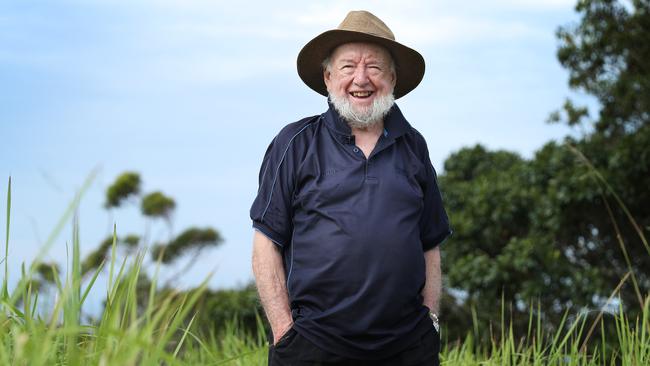‘We’re a pretend nation for opposing a republic’, says Tom Keneally
Writer and republican Tom Keneally says Australia has limited itself to the status of a ‘pretend nation’ by retaining the British monarch as head of state.

Writer and republican Tom Keneally says Australia has limited itself to the status of a “pretend nation” by retaining the British monarch as head of state, accusing the Albanese government of putting the republic cause in a “deep coma” after junking plans for a referendum on the issue.
The founding chair of the Australian Republic Movement declared King Charles III was not to blame for the nation’s constitutional arrangements but the “fault is our own”.
With the government putting a republic referendum on ice to focus on the cost of living, Keneally has written in The Australian, “Man does not live by bread alone, though bread is a bloody good start”.
“And so the republic, much like Shakespeare’s Juliet Capulet, has been put into a deep coma after consuming a death-imitating drug, delivered by our own government,” Keneally writes.
Keneally spoke out as the ARM brushed aside the setback by unveiling plans to spend the year holding community events to form a “people’s model” on the republic that would be ready to put to an eventual referendum.
ARM chief executive Isaac Jeffrey outlined an indicative model for the republic that would include a head of state elected on a five-year term using the compulsory preferential voting system.
Writing in The Australian, Keneally says the only way forward for republicans is to embrace the model of a directly elected president, as he lamented the latest setback for the cause he has long championed.
“There will come a day when there is assent on this issue across parties, and when the nonsense will, by our own consent, be lifted from us,” he writes.
“Until then we are a pretend nation of pretend allegiances, a secondary entity to the primary Westminster and United Kingdom. Our swimmers and our tennis players will never save us from this ridiculousness of not being a dinkum people unto ourselves.
“For our children have no right to identify with an Australian head of state in Canberra, but owe allegiance to a British King.”
The debate over the republic comes ahead of the annual push to change the date of Australia Day, with voice campaigner Megan Davis coming out against moving the national day from January 26th.
“Most mob I know don’t want it changed as it will just move the toxicity to another date,” Professor Davis said on X.
“Yet it came up continually as a reason not to support a voice.”
Assistant Minister for the Republic Matt Thistlethwaite has walked away from Labor’s aim to hold a republic referendum in the next term of parliament, arguing the government’s focus needs to be on the cost of living.
Mr Thistlethwaite backed the ARM’s focus to consult on a “people’s model” for the republic but he did not say if he would attend any community events.
“It’s a good thing to see more Australians discussing the constitution,” he said.
“The government’s priority at the moment is cost-of-living relief for Australians but we welcome the ARM’s public consultation and discussion of an Australian head of state.”
The ARM’s indicative model – to be finalised after a year of public consultation – includes the proposal for a directly elected head of state using the compulsory preferential voting system.
The head of state would be elected for five-year terms with a maximum of two terms, with candidates to be nominated by federal, state and territory parliaments.
Under the proposal, the prime minister would be written into the Constitution as the head of government, codifying the position’s role of administering the nation and setting the policy agenda.
The head of state would hold limited powers similar to the governor-general – such as calling elections and signing off on ministerial appointments – and would not have the ability to set policy.
The model for the 1999 republic referendum was for an Australian president to be appointed by parliament, with the successful candidate needing the support of two-thirds of federal politicians.
Writing in The Australian, Mr Jeffrey said the ARM would take lessons about the failures from “both sides” during the voice referendum.
“US-style politics has crept into Australia and was embraced by the campaigns,” Mr Jeffrey wrote.
“The voice and the republic campaigns failed on similar issues: partisanship; attacks labelling it as an elites’ model; distraction, fear and doubt; denigration; ego and bias. Issues created by both sides of the campaign.”
Constitutional expert Anne Twomey said a republic with a directly elected head of state required more amendments to the Constitution than one with a president chosen by parliament.
“If you have a directly elected head of state it gives rise to a concern about the exercise of the powers of (someone) who feels they have a mandate,” Professor Twomey said.
“The governor-general appoints the prime minister, can remove the prime minister, does the acts that involve the dissolution of parliament. All of these things are normally, by convention, exercised based on the advice of the prime minister. The question is, if you have an elected head of state, whether you try to codify those conventions in the Constitution or limit those powers or change the political system in a way those issues don’t arise.”





To join the conversation, please log in. Don't have an account? Register
Join the conversation, you are commenting as Logout